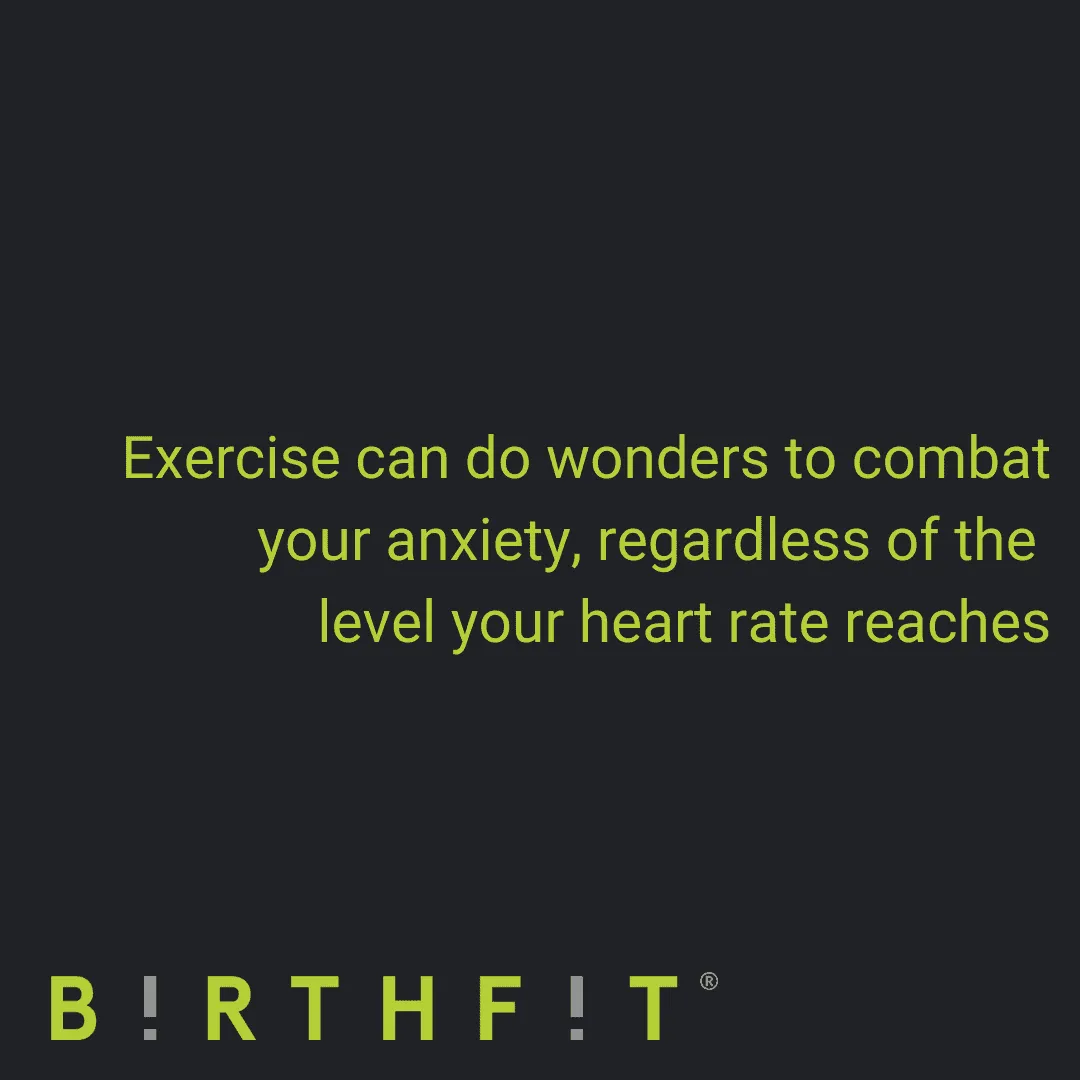Part 1: Fitness
Because this topic is so extensive and the issue is so prevalent (13%-21% of new mothers are expected to experience postpartum anxiety), we are going to break up this blog into the BIRTHFIT Four Pillars of fitness, nutrition, mindset, and connection.(1) We will dive into what steps you can take under each pillar to support your health and recovery, while learning to manage your anxiety.
Many people associate the word “postpartum” with the heart-wrenching stories of women who have suffered from postpartum psychosis and have committed tragic acts based on the hallucinations they suffer from. Postpartum illnesses fall on a spectrum known as perinatal mood and anxiety disorders (PMADs) and vary greatly among one another. I think it’s critical for EVERYONE, parent or not, to understand what the various terms surrounding this season mean and what the differences are.
Postpartum means “following childbirth,” so technically anyone who has given birth is and will forever be categorized as postpartum.
Postpartum psychosis is extremely rare, occuring in 0.1%-0.2% of postpartum women. The symptoms include but are not limited to:
- Hallucinations (visual or auditory)
- Paranoia
- Rapid mood swings
- Delusions(2)
Postpartum anxiety may occur in both the birthing and non-birthing person and may arise any time two weeks to the first year following childbirth. Symptoms may include, but are not limited to, the following:
- Constant worrying
- Feeling that something bad is going to happen to you, your baby, or other loved ones
- Racing, uncontrollable thoughts
- Disturbances to your sleep outside of the normal new parent sleep cycles
- Change in appetite
- Inability to sit still and let yourself rest/relax
- Physical symptoms such as hot flashes, dizziness, nausea(3)
As hormone levels normalize after birth, it is common and normal to experience intense and often very sudden mood shifts which people refer to as “Baby Blues.” Seemingly random bouts of weeping, irritability, and the symptoms listed above are all signs of this phase.
If you are experiencing any of the above symptoms beyond the first two weeks after the birth of your baby, it is important that you seek professional help, as this could be a sign that you are experiencing a PMAD.
Many people don’t seek support when they need it, fearing that people will think that they are “crazy” or that they will have their child taken away. Others may feel their symptoms aren’t “bad enough” to warrant help.
Remember, you are not your thoughts, and your thoughts are not your actions. Asking for help, no matter how scary or embarrassing your thoughts may be, is the most courageous thing you can do when experiencing a PMAD.
(4) Once in treatment with a trusted provider, there is a lot you can do at home to support yourself through this challenging time.
Let’s explore how our first pillar, fitness, can support your healing and management of symptoms.
Fitness can be such a nebulous term these days. For the purpose of this article, we want to encourage you to explore any movement practice that brings you joy and elevates your heart rate. Exercise can do wonders to combat your anxiety, regardless of the level your heart rate reaches. It diverts your mind from the future and forces you to stay present and connected to your body. Increasing your heart rate helps to change your brain chemistry, so that anti-anxiety neurochemicals like serotonin and GABA are more available – and we could all use a little more of those.(5)
Here are some ways to fit in fitness to support your mental health particularly as a new parent:
- BIRTHFIT: Search our database for a local coach or professional that can support your return to exercise. Be sure to let them know that you are learning to manage your anxiety so that they can modify the intensity of the workout to meet you where you are at. If you are not quite ready to commit to a fitness class outside of the house, we have great online programs to support your rehab and get you moving at home.
- Yoga: This is such a gentle reintroduction into movement postpartum. There are often classes where babies are welcome too. If you are also suffering from birth trauma, check your local area to see if there is a trauma-informed instructor. These classes are led with an understanding that each participant is in a period of recalibration and may feel more vulnerable to specific movements and cues. The instructor will modify the directives to suit your needs
- Walking outside: As little as 15 minutes a day may provide relief to your anxious feelings.(6) While walking, tune in to the present sensations you are experiencing in your body, rather than in your mind. To stay rooted in the present rather than spiraling into future worries in your mind, try and focus on the sights, sounds, physical things to touch, and smells within your environment. Take the time to interact with people and pets you pass along the way. You can also get a great dose of connection by meeting up with a friend to walk with.
We want to make it clear – the expectation is not that fitness alone will cure you of your postpartum anxiety. The path to mental and emotional wellness is multifaceted and far from linear. Implementing the above techniques can be preventative and support you in a period of peak anxiety. Stay tuned for our next segment in this series on how to utilize nutrition to support the anxious mind.
Tawny Linehan, BIRTHFIT Leader
www.birthfitcoachtawny.com @birthfit_coachtawny
Part 2: Tips to Manage Postpartum Anxiety — Nutrition
Part 3: Tips to Manage Postpartum Anxiety — Mindset
Part 4: Tips to Manage Postpartum Anxiety — Connection
Citations:
- “Perinatal Mood and Anxiety Disorders.” National Perinatal Association, 2018, www.nationalperinatal.org/resources/Documents/Position Papers/2018 Position Statement PMADs_NPA.pdf.
- “Postpartum Psychosis: Postpartum Support International (PSI).” Postpartum Support International – PSI, www.postpartum.net/learn-more/postpartum-psychosis/.
- “Postpartum and Antepartum Anxiety: Postpartum Support – PSI: Postpartum Support International (PSI).” Postpartum Support International – PSI, www.postpartum.net/learn-more/anxiety-during-pregnancy-postpartum/.
- “Baby Blues: Causes, Symptoms and Treatment.” American Pregnancy Association, 14 Oct. 2019, americanpregnancy.org/first-year-of-life/baby-blues/.
- Ratey, John J. “Can Exercise Help Treat Anxiety?” Harvard Health Blog, 22 Oct. 2019, www.health.harvard.edu/blog/can-exercise-help-treat-anxiety-2019102418096.
- “Depression and Anxiety: Exercise Eases Symptoms.” Mayo Clinic, Mayo Foundation for Medical Education and Research, 27 Sept. 2017, www.mayoclinic.org/diseases-conditions/depression/in-depth/depression-and-exercise/art-20046495.
Get Started
Effective programs for both MIND ⊕ BODY
This is a general strength and conditioning program for women in all seasons and cycles of life. You receive four workouts each week with options for those with limited equipment and variations on movements.
Start moving and training with your cycle ❤︎
Slow is Fast when you heal your core and pelvic floor from the inside out by starting with breath work, natural movement patterns, and continue to progressively build upon a solid foundation. The number one referral for doctors and midwives.
Are you open to conception? Join us in B! Community training. A general strength and conditioning for women that train while honoring their menstrual cycle. Everyone is in a different part of their journey, we support you where you are.
Do Pregnancy Different, when you connect with your body daily through a safe, effective prenatal training program for all levels and all fitness backgrounds that includes core and pelvic floor prehab, mobility, strength, and conditioning.





